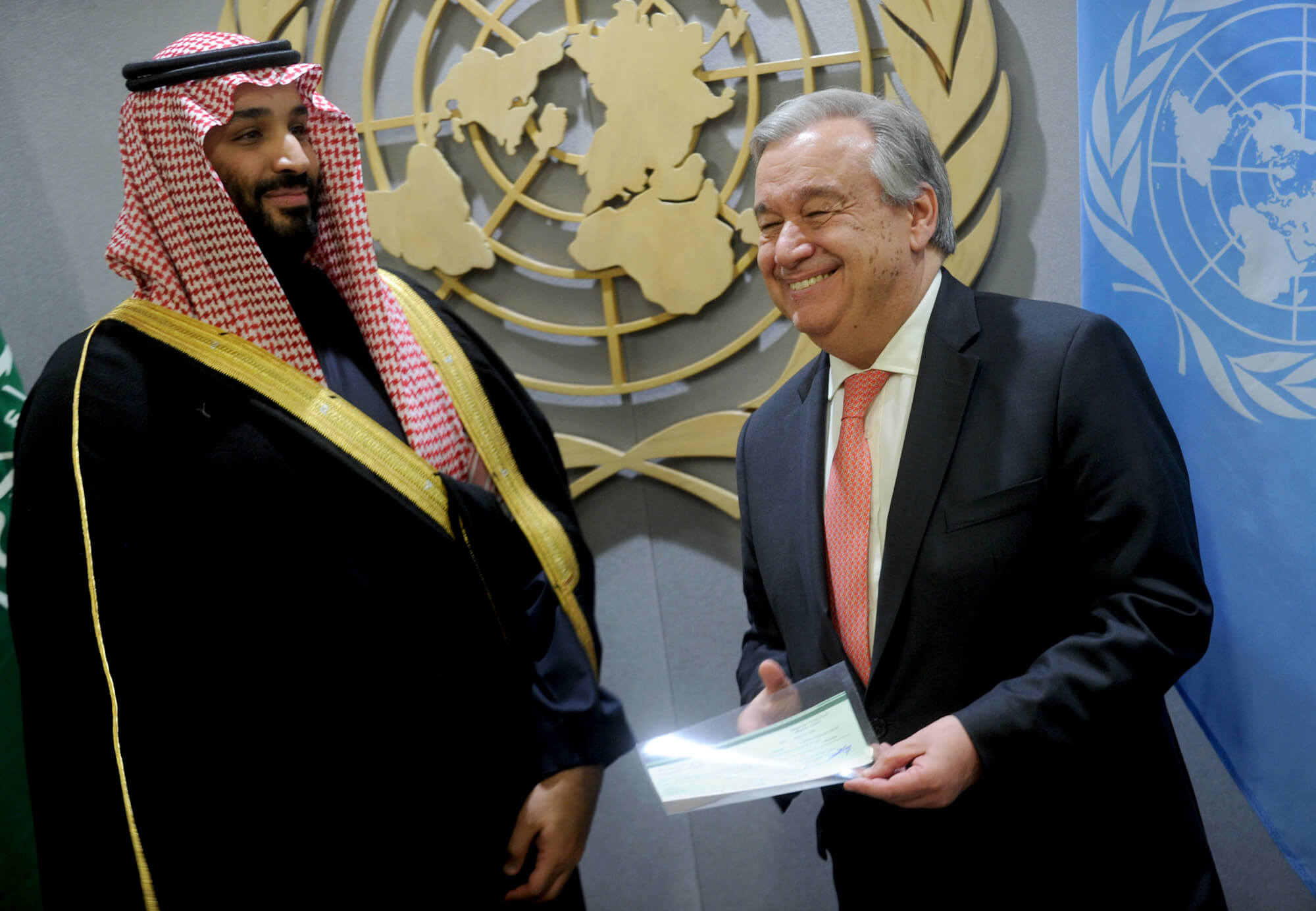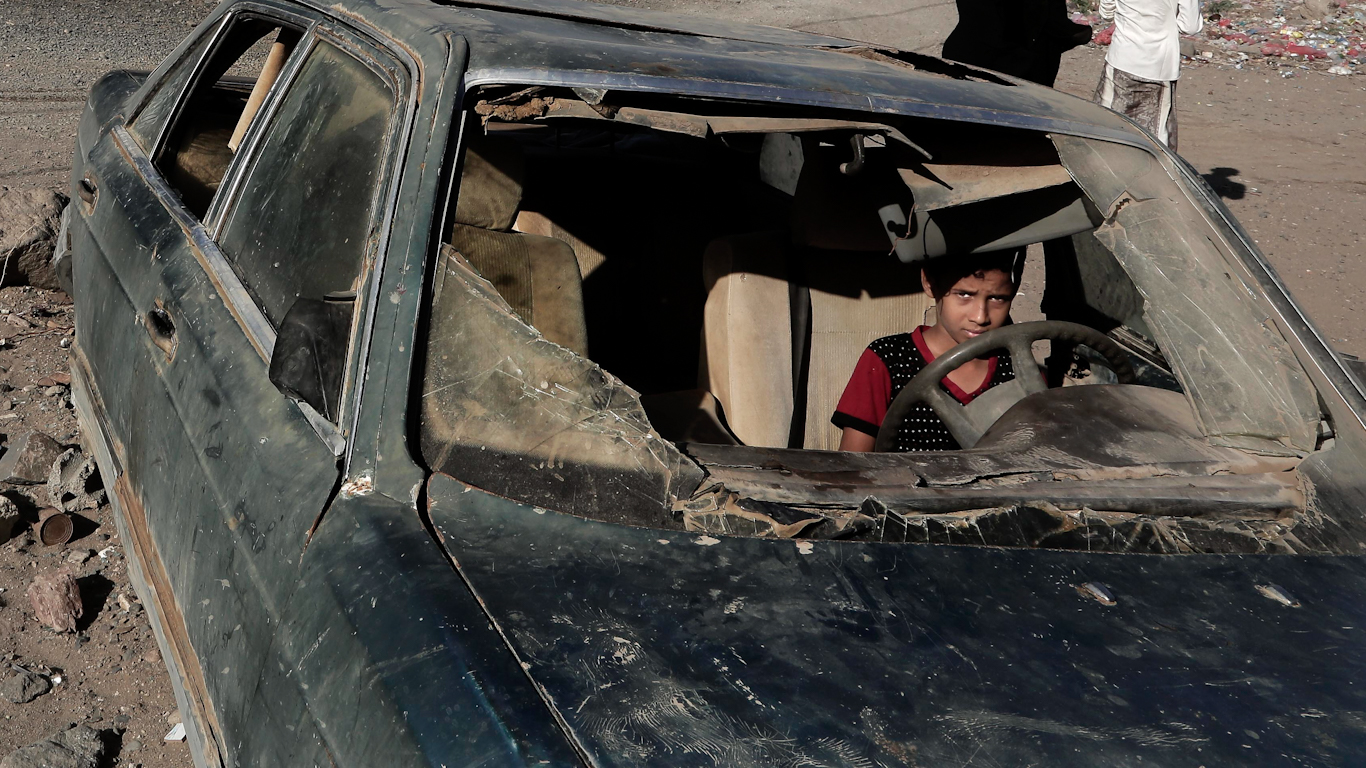SADAA, YEMEN — It was not the first time that the mother of Faisel Ahmed al-Jaser heard the small radio perched in the corner of her kitchen report that Saudi aircraft were once again dropping bombs in the area. This time, though, was different. She sensed something was amiss when she heard the aircraft buzzing overhead and would later come to find that one of the bombs had struck 14-year old Faisel, killing him instantly. The death of Faisel came as the United Nations announced a new decision this week to remove the Saudi-led coalition fighting in Yemen from a blacklist of parties that violate the human rights of children. This, despite the fact UN investigators have themselves reported that the Saudi forces have killed hundreds of children in Yemen in the past year alone.
In fact, even as Virginia Gamba, the United Nations Special Representative for Children and Armed Conflict, was busy telling reporters at a news conference that her boss had made the decision to remove Saudi Arabia from the blacklist, the bodies of children were burning inside of a car that was targeted by Saudi warplanes in Yemen’s northwestern province of Sadaa.
MintPress normally refrains from publishing graphic footage, but this latest decision by the United Nations puts the reality of what is happening on the ground in Yemen in the public interest. The aftermath of the Saudi attack on a family car filled with children is not easy to watch but it lays bare the nature of the total war that the Saudi coalition is waging on Yemeni civilians. MintPress cameraman Abdullah al- Humran captured the following images from the aftermath of the attack.
Warning | Graphic Content
“Unbelievable, dirty Saudi Riyals have dropped the Kingdom from the blacklist, shame on the UN,” Abdullah Jaber Ali al-Bojani told MintPress. Al-Bojani was among the family members gathered to recover the body parts of 12-year-old Abdullah, who was killed on Monday when a Saudi airstrike hit the car he was traveling in on a highway in the Sheda district in Saada province. In addition to Faisel and Abdullah, at least 14 people, among them four children and a woman, were killed and others were injured in the attack.
Two mine-clearance personnel and a medic also lost their lives on Monday when Saudi warplanes pounded the Kataf district in the same province just one after a similar attack last Wednesday that killed three civilians and injured another.
The recent United Nations decision has not only completely shaken up Yemen’s broken-heart families who lost children to coalition attacks, but it has also sparked concern that the United Nations is taking steps that will leave their-loved ones vulnerable to further Saudi attacks.
Yemeni activists and human rights groups accuse Antonio Guterres, the Secretary-General of the United Nations, of bias, saying that the move shows a blatant disregard for Saudi crimes that have documented by the UN itself. They say that the decision places a moral responsibility on Guterres and the United Nations for future Saudi crimes against children.
Yemen’s National Committee for Women views the UN decision as an attempt to provide official cover for all Saudi human rights violations and crimes against children and women in Yemen. The group pointed out that removing Saudi Arabia from the blacklist does not negate the crimes it has committed in Yemen.
For their part, Ansar Allah (Houthis) sharply censured the United Nations over the decision. Mohammed AbdulSalam, the spokesman and chief negotiator for Ansar Allah, condemned the UN decision and said that it cannot erase Saudi crimes from the record. He also stated that the move affirms that the UN is colluding with Saudi Arabia is no longer capable of acting as a broker for any political solution in Yemen or anywhere else.
Hisham Sharaf, Ansar Allah’s Foreign Minister in Sana’a, warned that removing the Saudi-led coalition from the list will only encourage the Saudi regime and its air force to continue their crimes against Yemen’s children. He described the decision as a setback for UN efforts to protect and promote children’s rights all over the world.
In retaliation for the latest Saudi attacks, the Yemeni army loyal to Houthis launched a massive operation on Thursday against coalition aircraft, armories, and other sensitive targets at the Saudi military base in Khamis Masheit.
Guterres’s “list of shame”
International human rights groups have also spoken out against the UN decision. Human Rights Watch accused Guterres of ignoring evidence of grave human rights violations.
“The secretary-general is adding a new level of shame to his ‘list of shame’ by removing the Saudi-led coalition and ignoring the UN’s own evidence of continued grave violations against children,” said Jo Becker, children’s rights advocacy director for Human Rights Watch.

Adrianne Lapar, director of Watchlist on Children and Armed Conflict, said that the delisting “sends the message that powerful actors can get away with killing children,” and called for “an independent, objective, transparent assessment of the process leading to the decision.”
The coalition has been on the blacklist for three years. It was added in 2016 but subsequently removed following protests from the Saudi government. Former Secretary-General Ban Ki-moon accused the kingdom of exerting unacceptable pressure on the UN with allied countries, allegedly threatening to cut vital funding for aid programs.
Guterres returned the Saudi-led coalition to the list in 2017 in the wake of Saudi attacks on Yemeni schools and hospitals but placed it in a newly created category. In 2018, Guterres removed the coalition from a list of parties that attack schools and hospitals, despite 19 UN-documented attacks on schools in the previous year.
In his annual report on children and armed conflict, released on June 15, 2020, Guterres reported that the Saudi-led coalition was responsible for 222 child casualties and four attacks on schools and hospitals in Yemen in 2019, but he removed the Kingdom from a list of parties responsible for grave human rights violations against children.
Guterres’s removal of Saudi Arabia from the list is also at odds with his “Call to Action on Human Rights” announced earlier this year, Human Rights Watch said. In that appeal, he said, “International humanitarian law and human rights law must be respected.” Yet his decision to delist or omit the Saudi Kingdom for grave violations of the rights of children raises questions about that commitment.
Feature photo | Yemeni mourners carry the coffin of a boy who was killed by a Saudi airstrike, during a funeral in Saada, Yemen, Aug. 13, 2018. Hani Mohammed | AP
Ahmed AbdulKareem is a Yemeni journalist. He covers the war in Yemen for MintPress News as well as local Yemeni media.


